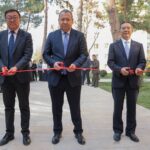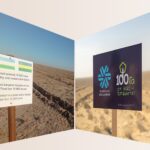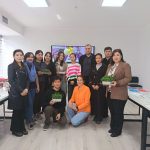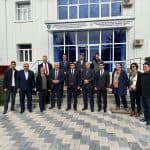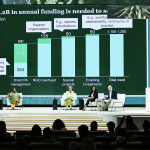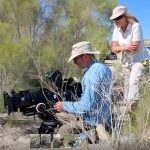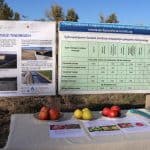Within the framework of the first meeting of the Ministerial Council of the Middle East Green Initiative (MGI), held in the city of Jeddah, Kingdom of Saudi Arabia, the Minister of Ecology, Environment and Climate Change Aziz Abdukhakimov held a number of meetings with ministers and heads of environmental agencies of foreign countries.
At the meeting with the Minister of Environment, Water and Agriculture of the Kingdom of Saudi Arabia, President of COP16 Abdulrahman Al Fadhli, A. Abdukhakimov was proposed to strengthen cooperation within the framework of the MGI initiative in the following areas:
- Creation of a network of in vitro laboratories for the purpose of growing drought-resistant plants adapted to survival in arid zones;
- Providing support to MGI in attracting technical and expert assistance in the creation of the “Expo Hub” of climate technologies (The Aral Valley) in the city of Muynak;
- Increasing further efforts to green Uzbekistan within the framework of the national project “Yashil Makon”, including at the regional level;
Assistance from Uzbekistan in expanding the geographical influence of the MGI platform, in particular, involving the countries of Central Asia and the Caucasus.
The Minister also informed the Saudi side about Uzbekistan’s active preparations for the upcoming COP16 and its intention to present the republic’s achievements in the national pavilion.
In turn, A. Al Fadhli announced Saudi Arabia’s support for the adoption of the Samarkand Declaration on dust and sand storms on the fields of COP16.
Following the meeting, the parties agreed to work out the projects proposed by Uzbekistan within the framework of MGI and strengthen joint efforts to promote desertification and land degradation issues in the international arena.
During the meeting with the Secretary General of the UN Convention to Combat Desertification (UNCCD) I. Thiaw, the parties discussed the possibility of involving UNCCD experts in the Climate Technology Expo Hub (The Aral Valley). I. Thiaw noted that the Aral Sea region has high potential and recommended focusing the work on scientific research and creating an ecosystem in which scientific research will have the opportunity for immediate testing in The Aral Valley.
During the meeting with the Minister of Environment and Climate of the State of Qatar Dr. A. Al Subaie, the development of close relations between the two countries was noted in connection with the recent visit of the Qatari delegation to Uzbekistan. The ministers agreed that Qatar and Uzbekistan share common problems of desertification and land degradation, and therefore it is necessary to make joint efforts to strengthen cooperation in this area.
Following the meeting, the parties agreed to create a two-year cooperation program between the ministries of the two countries, exchange working groups between Uzbekistan and Qatar to develop joint projects in the field of ecology and establish scientific exchange between the Central Asian University of Environment and Climate Change (Green University) and Hamad bin Khalifa University.
At a meeting with the Deputy Minister of Climate Change and Environment of the UAE M. Al Noaimi, A. Abdukhakimov noted the ongoing active work with the UAE in the field of ecology, in particular, the launch of a project with the participation of the TADWEER company to convert waste into energy.
The parties exchanged views on the UAE’s many years of experience in cloud seeding. M. Al Noaimi, being a member of the UAE Sprinkler Center Council, expressed his readiness to provide multilateral support to Uzbekistan in exchanging experiences and practices. The parties also reached an agreement on cooperation between Green University and the UAE University and the University of Artificial Intelligence to introduce artificial intelligence technologies in modeling and forecasting climate change.
During the talks with the Minister of Environment of the Hashemite Kingdom of Jordan M. Radaydeh, A. Abdukhakimov noted that Jordan and Uzbekistan, being landlocked countries, share similar problems of climate change, water shortages and desertification. Jordan has extensive experience in the application of desert technologies, water recycling, effective management of protected natural areas and developed ecotourism. The ministers also discussed Jordan’s practice of extracting and using methane from landfills for conversion into electricity.
Following the meeting, the parties agreed to sign a memorandum on the sidelines of COP29 in Baku, as well as to create a cooperation program and send expert groups to exchange experiences.
During the meeting with the Minister of Environment of the Arab Republic of Egypt Yasser Fuad, the parties discussed Egypt’s experience in air quality monitoring and vulnerability assessment. Given that Minister Y. Fuad is a co-chair of the negotiation process to achieve the New Collective Quantitative Goal on Climate Finance (NCQG), an agreement was reached to provide support in strengthening the position of Central Asia on the UNFCCC platform. Minister Y. Fuad also shared Egypt’s experience in hosting the Conference of the Parties to the UN Convention on Biodiversity.
Following the meeting, the Minister expressed her readiness to take part in the events of the national pavilion of Uzbekistan at COP29. Source: UZ DAILY https://www.uzdaily.uz/ru/uzbekistan-rasshiriaet-sotrudnichestvo-s-blizhnevostochnymi-stranami-dlia-borby-s-opustynivaniem-i-izmeneniem-klimata/


